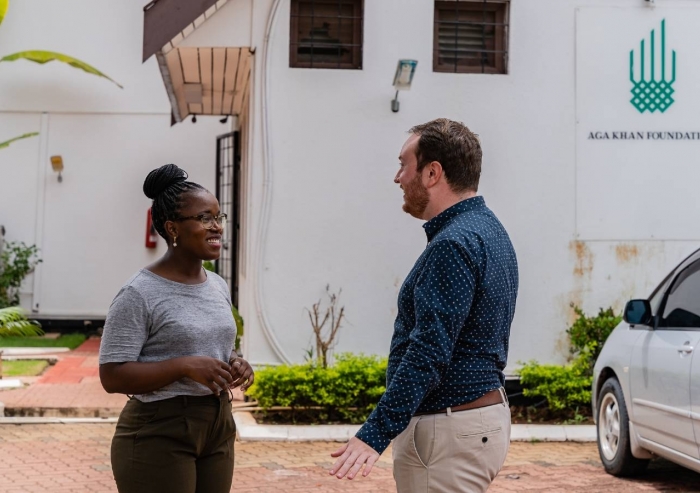“Here, the Jamatkhana will be reserved for traditions and practices specific to the Shia Ismaili tariqah of Islam. The Centre on the other hand, will be a symbol of confluence between the spiritual and the secular in Islam.”
Previously, we examined the history and role of Jamatkhanas, the ambassadorial role of the Ismaili Centres, and situated the Jamatkhana within the diversity of Muslim spaces of gathering and worship.
Here, we explore the important and often asked question:
“Why is the prayer space inside the Jamatkhana restricted only to Ismailis during congregational practice times?”
Like many religious communities and traditions, one important way in which Ismailis have maintained, preserved and transmitted their identity, wherever they have lived, has been through their places of gathering and prayer, including the most widely known space used today, the Jamatkhana.
Unlike non-denominational masjids, or mosques, which are public places, the Jamatkhana is a private space of gathering under the control of the Shia Ismaili Muslim Imam. The establishment, development and use of the Jamatkhana spaces and the variety of rituals performed in them is based on the authority, prerogative, and guidance of the hereditary Imam of the Time, descended from the Ahl-al Bayt (People of the House) of Prophet Muhammad (peace be upon him and his family).
Access to Congregational Worship in Jamatkhanas
A Jamatkhana is designated by the Imam for the use of Ismailis for Tariqah practices. Differentiated as a Tariqah-specific space of worship and gathering, the practices within it are inherently linked to the relationship between the Imam and his murids, or followers, and are thus limited to those who have given their bay‘a, or allegiance, to the Imam of the Time.
The practice of giving bay‘a as an oath of allegiance is rooted in the custom of the Prophet and in several verses of the Qur’an. In many Muslim traditions, it means to offer oneself to a spiritual master in exchange for spiritual knowledge and guidance. For Shia Ismaili Muslims, bay‘a is, “the acceptance of the permanent spiritual bond between the Imam and the murid, uniting all Ismaili Muslims worldwide in their loyalty, devotion and obedience to the Imam within the Islamic concept of universal brotherhood.”
Therefore, the principle of admission to Jamatkhana for congregational worship on the basis of bay‘a to the Imam is one that cannot be compromised.
Throughout history, Ismailis have had private spaces limited to those who have given bay‘a to the Imam. According to the article “Ismaili History” by Dr. Farhad Daftary, during the Fatimid period when the Ismaili Imamat ruled a state based in North Africa and Egypt, “private lectures on Ismaili esoteric doctrine, known as the majalis al-hikma or ‘sessions of wisdom,’ were reserved exclusively for the Ismaili initiates who had already taken the oath of allegiance…”
However, while Tariqah-specific congregational prayers held in the Jamatkhana prayer hall are only for the members of the Ismaili community, many other spaces within Jamatkhana complexes are open to the larger community within which they live. They function as religious, educational and social centres, promoting dialogue, discussion and community building.
Public and Private Spaces of Religious Gathering
The notion of public and private spaces and restricted participation during the performance of specific practices and prayers is not unique to the Ismaili Tariqah and its Jamatkhanas. Beyond Islam, similar restrictions on access to spaces and practices are common across other religious traditions and communities.
For example, in a Synagogue, only members of the Jewish faith are able to participate in all rituals. Similarly, not everyone can enter into Catholic oratories and chapels; nor can everyone enter all the monasteries, nunneries, or retreats of the Jesuits. While Mormon chapels are open to the public, Mormon temples are reserved only for baptized members in good standing. All Buddhist spaces are also not equally accessible to everyone.
Within Islam, there are many communities of interpretation that also designate certain spaces, times, thresholds, ritual performances and contexts as private and confined to those having provided their bay‘a to the shaykh, murshid or the Imam of that community, particularly those who lean towards an esoteric or batini interpretation of faith, like Ismailis.
Previously, we discussed the Ribat, Zawiya, Tekke and Khanaqah, which are all spaces traditionally associated with Sufi Tariqahs. Some are open to the public and others are reserved for private, Tariqah-specific practices.
In his article “Muslim Spaces of Piety and Worship,” Karim Jiwani writes,
“Admission to such spaces is usually open to all, but this is not universally true. For instance, khanaqahs of the Suhrawardi Order in India are known to restrict participation to those who have given their bay‘a, pledge of allegiance, to the pir or shaykh of the Sufi Order. With regard to the issue of the exclusivity of such spaces, Sunni jurists have viewed it to be a matter dependent on custom.”
Similar to many diverse practices within and beyond Islam, as Ismailis we also acknowledge that we belong to the larger family of humanity and have non-Ismaili members as part of our families and network of close relations. Therefore, many of our Jamatkhanas, particularly the Ismaili Centres, also include spaces which welcome non-Ismailis to share in our communal home with us. This ethos was emphasized by Mawlana Hazar Imam at the opening of the Ismaili Centre, Toronto in 2014:
“These are places where Ismailis and non-Ismailis, Muslims and non-Muslims, will gather for shared activities — seminars and lectures, recitals and receptions, exhibitions and social events. These meeting halls and lounges, work offices and conference rooms will serve the organisational needs of the Ismaili community. But they will also, we trust, be filled with the sounds of enrichment, dialogue and warm human rapport, as Ismailis and non-Ismailis share their lives in a healthy gregarious spirit!”
Below are further resources to learn more about the congregational practice and privacy:
- Muslim Spaces of Piety and Worship, Karim Jiwani, The Institute of Ismaili Studies
- What Is Shi’a Islam?, Dr. Farhad Daftary and Professor Azim Nanji, The Institute of Ismaili Studies
- Glossary, The Institute of Ismaili Studies
Thank you for visiting this website. In order to improve the quality of the website, please complete a short survey. The data collected will help us to serve you in a more effective and efficient manner.
Please click on this link to complete the survey.








